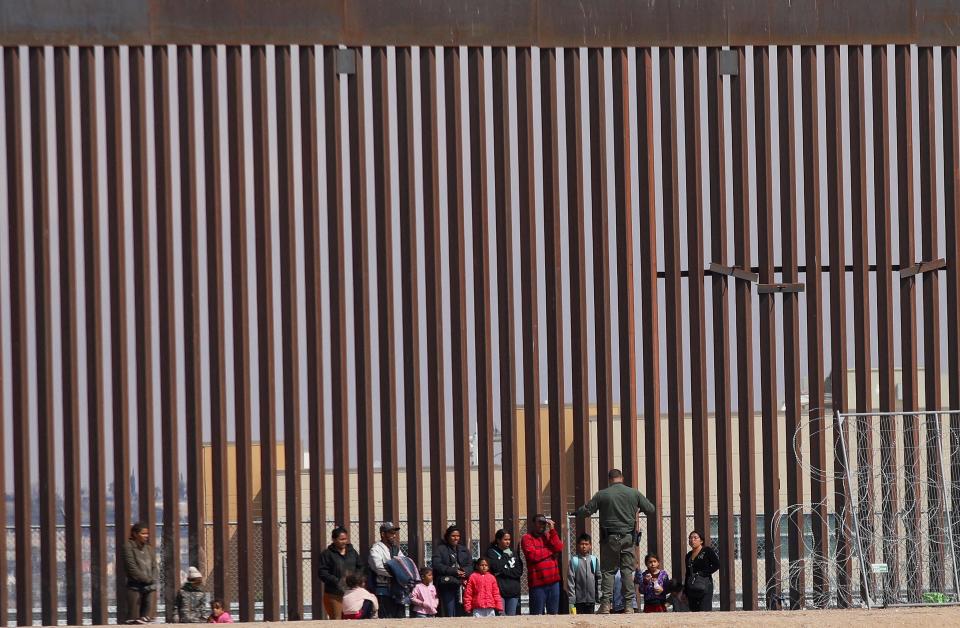Supreme Court keeps on hold, for now, Texas law that allows police to arrest migrants
WASHINGTON ? The Supreme Court has weighed in on the latest dispute between the Biden administration and Texas over the southern border, keeping a controversial state law from taking effect ? for now ?while the law is being challenged.
Swiftly responding to an emergency appeal from the Justice Department filed Monday afternoon, the court said it would keep on hold until at least March 13 a Texas law that empowers state law enforcement to detain and deport migrants entering or living in the U.S. illegally.
A panel of judges on the New Orleans-based U.S. Court of Appeals for the 5th Circuit had said the law would take effect Saturday unless the Supreme Court intervened.
That would "create chaos" in the federal government's efforts to administer federal immigration law in Texas, the Justice Department said in its emergency appeal to the high court.
The department called the law "flatly inconsistent" with the court's past decisions, which recognized that the power to admit and remove noncitizens lies solely with the federal government.
The emergency appeal is the latest development in the federal government's attempt to quash the law and is part of a larger, high-pitched battle between Texas and the Biden administration over enforcement of the southern border.
Texas Gov. Greg Abbott ?whose border crackdown also includes a program to bus migrants out of state and install razor wire barriers in the Rio Grande ?argues the federal government isn't doing its job amid record crossings at the southern border.
U.S. District Judge David Alan Ezra on Thursday preliminarily prevented Texas from enforcing the law, which would make it a state crime to cross the Texas-Mexico border. In his order granting an injunction, Ezra said that “states may not exercise immigration enforcement power except as authorized by the federal government.”
“Surges in immigration do not constitute an ‘invasion’ within the meaning of the Constitution, nor is Texas engaging in war by enforcing SB4,” Ezra said in the order.
But the appeals court on Saturday granted Texas' request to intervene, giving the Biden administration a week to get the Supreme Court to decide whether the law should take effect while it's being challenged.
The Supreme Court extended that deadline Monday and gave Texas until March 11 to tell the justices why the law should not remain on hold.

In addition to the federal government, the law is being challenged by El Paso County, Texas, and Las Americas Immigrant Advocacy Center, which provides pro bono legal representation to asylum-seekers and other immigrants in El Paso.
Abbott and the legislative authors of the bill say state troopers won’t target longtime residents of Texas but only those suspected of crossing illegally within the border zone.Border community leaders and immigrant advocates say the law will unfairly target their majority-Hispanic communities.
Large Texas border cities including El Paso and Laredo and small communities such as Roma and Eagle Pass live by the coming and going of U.S and Mexico residents who crisscross the border lawfully to visit family, go to school or do business.
Allowing Texas to deport migrants to Mexico, the Justice Department told the Supreme Court, would "have significant and immediate adverse effects on the United States' relationship with Mexico ?a relationship that is critical to the federal government's ability to effectively address immigration at the southwest border."
Marisa Limón Garza, executive director of Las Americas, said she is worried S.B. 4 will lead to racial profiling, especially in border communities.
“When we cross here in El Paso, with a passport or a visa, I don’t get a stamp in my passport book,” she said. “How will (state troopers) know I crossed legally if there is no proof? The state says, ‘Police officers are well-trained and they will be able to make a determination based on behavior.’ If you are anything other than white or passing, then you can receive the strong hand of the law.”
More: Joe Biden, Donald Trump clashing visits thrust border fight further into spotlight
This article originally appeared on USA TODAY: Supreme Court pauses Texas law that allows police to arrest migrants
